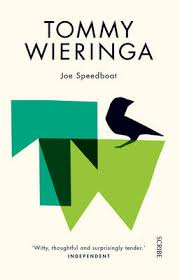
Dutch author Ernest Van Der Kwast made his breakthrough with this 2010 Netherlands and Italian best-seller translated now into English by Laura Vroomen. Publishers Scribe have done a great job in the recent past bringing Dutch authors to wider attention- their 2006 publication of Tommy Wieringa’s “Joe Speedboat” is the current Reviewsrevues Book of The Year and here is another strong title.
“Mama Tandoori” is a study of a family with Dutch and Indian parents. An autobiographical novel which focuses on Ernest’s mother whose outrageous behaviour verges on the monstrous. She is a woman determined to get her own way as cheaply as possible. I was initially quite resilient to Van Der Kwast’s fictional account of his childhood whilst reading of a trip to Lourdes with his disabled brother but the novel really began to draw me in when other adult characters were added to the mix. I found myself fascinated by Uncle Sharma who came from a dirt-poor background and was transported by a visiting outdoor cinema into dreams of becoming a movie star, which came to be realised. From here things all fall into place and I seemed to appreciate more the wider family dynamics. Mother herself became a more rounded character in my mind when running alongside her competing son on the athletics track and proving to be too nervous to pin on his race number.
There is no doubt that this character can be mean but this meanness does become more appealing in a tragi-comic way. Her ploy to get a fitted kitchen out of her husband’s dying grandmother is shocking but you cannot help but admire the gall of this character. The humour is ramped up by the contrast between the narrator’s unemotionally “wooden-hipped” Dutch relatives and the fiery passion and determination of the Indian women. His mother will both shock you and win you over in laugh-out-loud moments.
Van Der Kwast writes in a likeable, easy style which makes the book feel highly visual and enjoyable. It has certainly made me keen to read his take on the Italians in his Dolomites-set family saga “The Ice Cream Makers” also published as a Scribe paperback.

Mama Tandoori is published on 10th August 2017 by Scribe. Many thanks to the publishers for the advance review copy.








 This is the eleventh publication from this Dutch prize winning author (he has now published twelve in his homeland –three are available as English translations). Set on and around the steppes of Eastern Europe a Police Commissioner Pontus Beg finds himself forming a bond with the only Rabbi left around. As he embarks on his own personal odyssey a much crueller one is taking place.
This is the eleventh publication from this Dutch prize winning author (he has now published twelve in his homeland –three are available as English translations). Set on and around the steppes of Eastern Europe a Police Commissioner Pontus Beg finds himself forming a bond with the only Rabbi left around. As he embarks on his own personal odyssey a much crueller one is taking place.